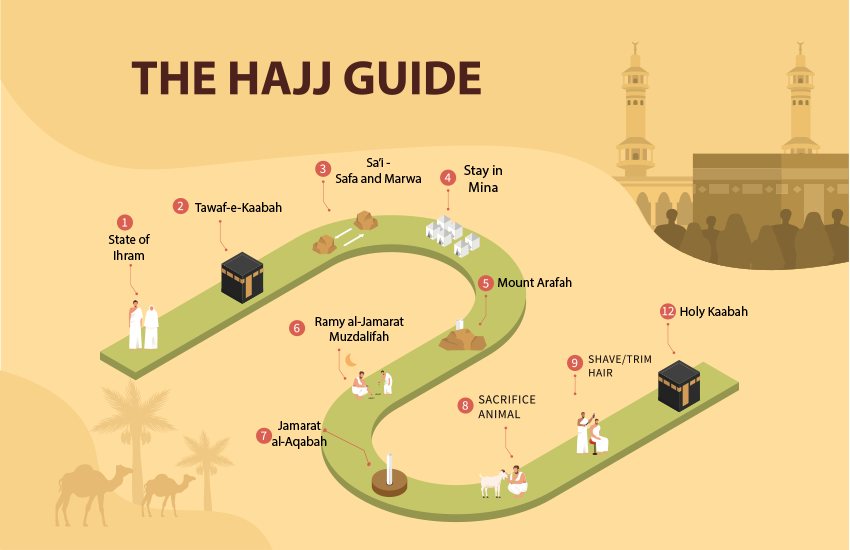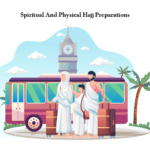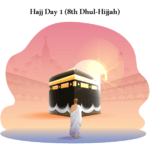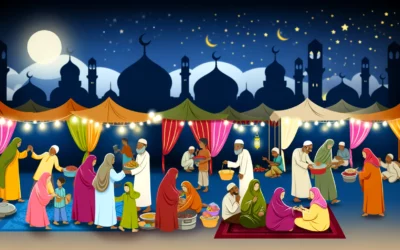Millions of Muslims from around the world gather annually in Mecca in anticipation of Hajj– the Muslim pilgrimage that follows the Prophet Muhammad’s actions almost 1400 years ago. In the article, we will briefly explain the guideline for the Hajj Journey and briefly introduce what Hajj is and why it is essential?
What is Hajj, and why is it important?
Hajj is the more extraordinary Muslim pilgrimage to Mecca in Saudi Arabia, which take place in the last month of the Lunar Calendar, Dhul Hijjah.
Abu Huraira narrated that The Prophet (ﷺ) was asked,
“Which is the best deed?” He said, “To believe in Allah and His Apostle.” He was then asked, “Which is the next (in goodness)?” He said, “To participate in Jihad in Allah’s Cause.” He was then asked, “Which is the next?” He said, “To perform Hajj-Mabrur. “
It is a spiritual, emotional and physical challenge, and Hajj is a prospect to refresh our spiritual self, cleanse us of our sins and renew our faith in Allah.
Abu Huraira narrated that the Prophet Muhammad (SAW) said,
“Whoever performs Hajj for Allah’s pleasure and does not have sexual relations with his wife, and does not do evil or sins then he will return (after Hajj free from all sins) as if he were born anew.”
(Bukhari; Muslim)
All Muslims must make at least once during their lifetime if they can physically and financially afford it.
The Hajj is one of the five pillars of Islam and is obligatory for those who can afford it.
The Prophet Muhammad (SAW) strictly said to those who can afford but do not perform the Hajj,
“Whoever has the provisions and the means to convey him to Allah’s House and he does not perform Hajj, it does not matter if he dies as a Jew or a Christian. Allah said in His Book: ‘And Hajj to the House is a duty that mankind owes to Allah, for whoever can bear the journey.’
Journey of Hajj- Step to Step Guideline
Hajj is the journey of 5 days from the 08th- 12th of Dhul Hijjah. A complete guideline for the journey of Hajj.
First Day of Hajj- 08 Dhul Hijjah
-
Intention (Niyyah) for Hajj
On the 8th of Dhul-Hijjah, the first step after arriving at Makkah to start Hajj is essential to make a pure intention for the Hajj. Before the journey starts, every pilgrim should be clear about their intentions. The intention must be to perform the Hajj for the sake of Allah Alone with the desires for the Hereafter. It should not be done to be seen among others or for worldly.
-
State of Ihram
The most necessary step is to enter into the state of Ihram. Ihram is related to the states of purity which is compulsory while crossing the boundaries of Mecca called Miqat.
Muslim pilgrims are advised to wear the Ihram, which consists of two unstitched white sheets that must wrap one piece around your shoulder and one around your waist. Ladies can wear loose-fitting clothes but should follow the rules of the Hijab; covering the face isn’t permitted.
It is the spiritual state you enter once you intend to go to Hajj. It is the physical intention of Hajj. When you are in the state of Ihram, the sanctification of the Ihram should not be violated; no sexual relation, no violence, or disobedience is allowed in Ihram.
ٱلْحَجُّ أَشْهُرٌ مَّعْلُومَٰتٌ ۚ فَمَن فَرَضَ فِيهِنَّ ٱلْحَجَّ فَلَا رَفَثَ وَلَا فُسُوقَ وَلَا جِدَالَ فِى ٱلْحَجِّ ۗ وَمَا تَفْعَلُوا۟ مِنْ خَيْرٍ يَعْلَمْهُ ٱللَّهُ ۗ وَتَزَوَّدُوا۟ فَإِنَّ خَيْرَ ٱلزَّادِ ٱلتَّقْوَىٰ ۚ وَٱتَّقُونِ يَٰٓأُو۟لِى ٱلْأَلْبَٰبِ
Hajj is [during] well-known months, so whoever has made Hajj obligatory upon himself therein [by entering the state of ihrām], there is [to be for him] no sexual relations and no disobedience and no disputing during Hajj. And whatever good you do – Allāh knows it. And take provisions, but the best provision is fear of Allāh. And fear Me, O you of understanding. (AlQuran 2:197)
-
Talbiyah
Talbiyah is the special prayer said while on the sacred journey of Hajj.
لَبَّيْكَ اللهُمَّ لَبَّيْكَ – لَبَّيْكَ لَا شَرِيْكَ لَكَ لَبَّيْكَ – إِنَّ الْحَمْدَ وَالنِّعْمَةَ لَكَ وَالْمُلْكَ – لَا شَرِيْكَ لَكَ
labbayka -llāhumma labbayka, labbayka lā šarīka laka labbayka, ʾinna -l-ḥamda wa-n-niʿmata laka wa-l-mulka lā šarīka lak
“Here I am [at your service] O God, here I am. Here I am [at your service]. You have no partners (other gods). To You alone is all praise and excellence, and to You is all sovereignty. There is no partner to You.”
-
Tawaf-e-Kabbah
Hajj involves a series of rituals in and around Mecca over five to six days; the first among them is Tawaaf-e-Kaabah, in which Muslims walk around the Kaabah seven times in an anti-clockwise direction.
وَإِذْ بَوَّأْنَا لِإِبْرَٰهِيمَ مَكَانَ ٱلْبَيْتِ أَن لَّا تُشْرِكْ بِى شَيْـًٔا وَطَهِّرْ بَيْتِىَ لِلطَّآئِفِينَ وَٱلْقَآئِمِينَ وَٱلرُّكَّعِ ٱلسُّجُودِ
And [mention, O Muhammad], when We designated for Abraham the site of the House, [saying], “Do not associate anything with Me and purify My House for those who perform Tawaf and those who stand [in prayer] and those who bow and prostrate. (AlQuran 22:26)
Muslims believe that the Tawaaf-e-Kaabah have its origin in the time of the Prophet Ibraham himself in 632.
Once the pilgrims finish their Tawaf, they offer two Rakat Nafl at Maqam Ibrahim (The place of Prophet Ibraham, where he prayed when building the Kaaba)
-
Sa’i: Safa and Marwa
Sa’i is the ritual of Hajj, walking back and forth between two hills known as Safa and Marwa hills seven times. This act of running or walking between the two hills reminds Prophet Abraham’s wife, Hajjra and son Ismail.
إِنَّ ٱلصَّفَا وَٱلْمَرْوَةَ مِن شَعَآئِرِ ٱللَّهِ ۖ فَمَنْ حَجَّ ٱلْبَيْتَ أَوِ ٱعْتَمَرَ فَلَا جُنَاحَ عَلَيْهِ أَن يَطَّوَّفَ بِهِمَا ۚ وَمَن تَطَوَّعَ خَيْرًا فَإِنَّ ٱللَّهَ شَاكِرٌ عَلِيمٌ
Indeed, as-Safā and al-Marwah are among the symbols of Allāh. So whoever makes Hajj [pilgrimage] to the House or performs ‘umrah – there is no blame upon him for walking between them. And whoever volunteers good – then indeed, Allāh is Appreciative and Knowing. (AlQuran 2:158)
After completing Umrah rituals, Hajj al-Tamatt’u pilgrims must assume the state of Ihram and declare their intentions and repeat Ihram to do Hajj again.
-
Stay in Mina
Mina, a small town called the “City of Tents”, is almost 8 kilometres from Makkah. The pilgrims are advised to stay there the following day and offer the five prayers, starting with the noon prayer Zuhr, then Asr, Maghrib, Isha and ending with the dawn prayer Fajr.
Pilgrims spend the day and the whole night in Mina, and on the 9th of Dhul Hijjah, after offering the dawn prayer, Fajr, the pilgrims make their way to Arafat, roughly 14 kilometres away.
Second Day of Hajj- 09 Dhul Hijjah
-
Mount Arafah
The 9th Dul Hijjah is the Day of Arafat; after the Dawn Prayer, Pilgrims start walking towards the Arafat while reciting Talbiyah, Istaghfar and making the supplications.
A sermon will be delivered from Masjid-e-Nimra on Mount Arafah on the Day of Arafat. Upon reaching Mount Arafah, pilgrims observe Dhuhr and Asar prayer combined and shortened offer two rakats instead of Four.
The Day of Arafat is considered one of the most critical days in the Islamic Calendar. Hajj is not valid without the Day of Arafat. Any pilgrim who misses the Day of Arafat misses the whole Hajj.
-
Ramy al-Jamarat: Collect stones at Muzdalifah.
On the 9th of Dhul Hijjal, after sunset, the pilgrims move this time to Muzdalifah, a valley between Arafat and Mina. Where they spend the whole night under the sky and also gather small pebbles for tomorrow’s rite.
Third-Day of Hajj- 10 Dhul Hijjah
-
Stoning of Jamrat: Throw stones at the pillars.
On the 10th of Dhul Hijjah on the Day of Eid-ul-Azha, After the dawn prayer, Pilgrims leave Muzdalifah and proceed to Mina, where they perform the first Rami, throwing pebbles at the three-column.
The stoning of Jamrat is conducted in the memory of the act of the Prophet Ibrahim (AS) when the devil tried to discourage him from following Allah’s command. Prophet Ibrahim (AS) threw small pebbles to make evil go away. l
And the act of stoning Jamrat should be carried out at noon each day till the 12th of Dhul Hijjah.
-
Animal Sacrifice- Nahr
After the Rami, the pilgrims are advised to perform the sacrifice of slaughter animals, camels, goats or lambs or purchase sacrifice coupons or vouchers, stating that the sacrifice has been made on their behalf.
This ritual also goes back to Prophet Ibrahim when Allah commanded him to sacrifice His son Ismail as a testament of faith. Ibrahim was willing to execute when Allah commanded him to sacrifice an animal instead of as a reward for his unwavering faith at the last minute.
Pilgrims followed Prophet Muhammad’s teachings during his farewell pilgrimage when he sacrificed a few camels, ate little from what they sacrificed then gave the rest for charity.
It is mentioned in the Quran,
وَأَتِمُّوا۟ ٱلْحَجَّ وَٱلْعُمْرَةَ لِلَّهِ ۚ فَإِنْ أُحْصِرْتُمْ فَمَا ٱسْتَيْسَرَ مِنَ ٱلْهَدْىِ ۖ وَلَا تَحْلِقُوا۟ رُءُوسَكُمْ حَتَّىٰ يَبْلُغَ ٱلْهَدْىُ مَحِلَّهُۥ ۚ فَمَن كَانَ مِنكُم مَّرِيضًا أَوْ بِهِۦٓ أَذًى مِّن رَّأْسِهِۦ فَفِدْيَةٌ مِّن صِيَامٍ أَوْ صَدَقَةٍ أَوْ نُسُكٍ ۚ فَإِذَآ أَمِنتُمْ فَمَن تَمَتَّعَ بِٱلْعُمْرَةِ إِلَى ٱلْحَجِّ فَمَا ٱسْتَيْسَرَ مِنَ ٱلْهَدْىِ ۚ فَمَن لَّمْ يَجِدْ فَصِيَامُ ثَلَٰثَةِ أَيَّامٍ فِى ٱلْحَجِّ وَسَبْعَةٍ إِذَا رَجَعْتُمْ ۗ تِلْكَ عَشَرَةٌ كَامِلَةٌ ۗ ذَٰلِكَ لِمَن لَّمْ يَكُنْ أَهْلُهُۥ حَاضِرِى ٱلْمَسْجِدِ ٱلْحَرَامِ ۚ وَٱتَّقُوا۟ ٱللَّهَ وَٱعْلَمُوٓا۟ أَنَّ ٱللَّهَ شَدِيدُ ٱلْعِقَابِ
And complete the hajj and ‘umrah for Allāh. But if you are prevented, then [offer] what can be obtained with ease of sacrificial animals.
And do not shave your heads until the sacrificial animal has reached its place of slaughter. And whoever among you is ill or has an ailment of the head [making shaving necessary must offer] a ransom of fasting [three days] or charity or sacrifice.
And when you are secure, whoever performs ‘umrah [during the hajj months] followed by Hajj [offers] what can be obtained with ease of sacrificial animals.
And whoever cannot find [or afford such an animal] – then a fast of three days during Hajj and seven when you have returned [home]. Those are ten complete [days]. This is for those whose family is not in the area of al-Masjid al-Harām. And fear Allāh and know that Allāh is severe in retribution. (AlQuran 2:196)
-
Halq or Taqsir
After animal sacrifice, Pilgrim men must cut their hair or shave it completely. And for the women, it’s typically cutting just a single lock of hair.
Fourth day & Fifth day- 11th and 12th of Dhul Hijjah
-
Tawaf and Sa’i
Pilgrims will head back to Mecca to perform Tawaf and Sa’i. They will continue back and forth seven times.
-
Stoning of Jamrat
And the act of stoning Jamrat should be carried out at noon each day till the 12th of Dhul Hijjah. Pilgrims would stone each pillar with seven small pebbles while repeating “Allahu Akbar”.
-
Tawaf Al-Ifadha
The last and final step is the farewell Tawaf called Tawaf Al-Ifadha, circumambulation of the Holy Place, Kaaba anti-clockwise seven times as per the teaching of Prophet Muhammad (SAW) guidance and then prayed two rakaat in Masjid Al-Haram.
فَإِذَا قَضَيْتُم مَّنَٰسِكَكُمْ فَٱذْكُرُوا۟ ٱللَّهَ كَذِكْرِكُمْ ءَابَآءَكُمْ أَوْ أَشَدَّ ذِكْرًا ۗ فَمِنَ ٱلنَّاسِ مَن يَقُولُ رَبَّنَآ ءَاتِنَا فِى ٱلدُّنْيَا وَمَا لَهُۥ فِى ٱلْءَاخِرَةِ مِنْ خَلَٰقٍ
And when you have completed your rites, remember Allāh like your [previous] remembrance of your fathers or with [much] greater remembrance. And among the people is he who says, “Our Lord, give us in this world,” and he will have in the Hereafter no share. (AlQuran 2:200)
Way to Medina
The virtues of Hajj will be completed on the 12th of Dhul Hijjah. Before returning home, you must visit Medina, the second holiest city in Islam. It is not a part of Hajj but the place where the Prophet Muhammad (SAW) is buried with His companion and must visit the Holy Places in Saudi Arabia.

















